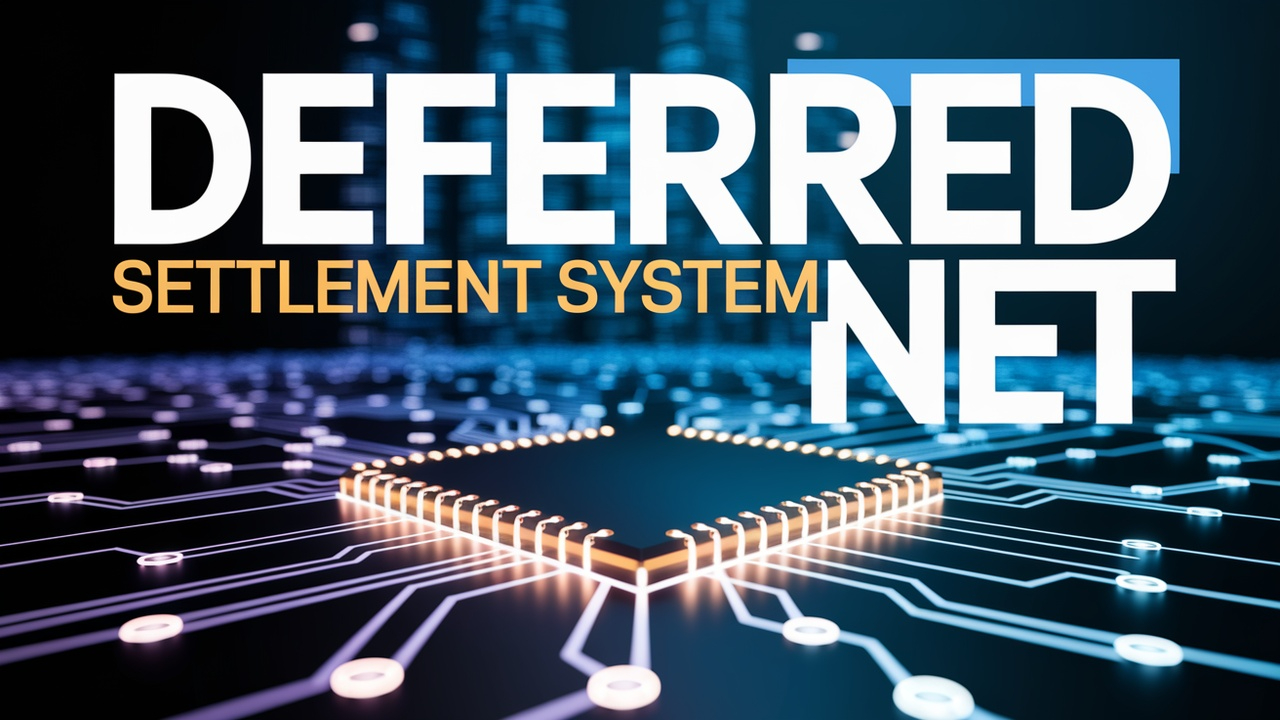DNSS Full Form - Deferred Net Settlement System
by Shashi Gaherwar
0 1069
Introduction
The Deferred Net Settlement (DNS) System is a payment settlement mechanism used in banking and financial markets where transactions are accumulated over a period and settled in batches at a designated time. This system contrasts with Real-Time Gross Settlement (RTGS), where transactions are processed individually and instantly. The DNS system plays a vital role in facilitating efficient and cost-effective financial transactions globally.

In this article, we explore the mechanism, advantages, challenges, and future trends of the Deferred Net Settlement System in modern financial markets.
What is the Deferred Net Settlement System?
The Deferred Net Settlement System (DNS) is a payment processing method where multiple financial transactions between banks or institutions are aggregated and settled at specific intervals. Instead of settling transactions in real-time, DNS allows participants to offset payments, reducing the total amount of funds required for settlement.
This system is widely used in interbank transactions, retail payment networks, credit card payments, and securities clearinghouses to enhance financial efficiency.
How Does the Deferred Net Settlement System Work?
1. Transaction Accumulation
Throughout a business day, multiple financial transactions occur between banks and financial institutions. Instead of settling each transaction immediately, the payments are recorded and held for batch processing.
2. Netting of Transactions
At a designated settlement time, all recorded transactions are netted—meaning the amounts owed and received are offset against each other. Each bank or institution receives a final net settlement amount instead of processing individual payments.
3. Settlement at Central Bank or Clearinghouse
The net settlement amount is processed through a central clearinghouse or central bank, which finalizes the transfers. The actual movement of funds occurs only for the net difference, minimizing liquidity requirements for banks.
Benefits of the Deferred Net Settlement System
1. Efficiency in Payment Processing
By netting multiple transactions, DNS reduces the number of financial movements, leading to increased efficiency in banking operations.
2. Lower Liquidity Requirements
Banks and financial institutions do not need to maintain large reserves of funds for real-time settlements, improving liquidity management.
3. Cost-Effective for Banks
Since transactions are processed in batches, DNS reduces settlement costs and operational expenses associated with real-time transactions.
4. Enhanced Financial Stability
DNS ensures that large-scale payments are processed smoothly, preventing sudden liquidity crises in the banking system.
5. Supports High Transaction Volumes
Ideal for retail banking, e-commerce payments, and international remittances, where multiple transactions occur daily.
Challenges of the Deferred Net Settlement System
1. Settlement Risks
Since transactions are not settled immediately, there is a risk that a bank may fail before the net settlement occurs, leading to potential defaults.
2. Time Delays in Fund Transfers
Unlike RTGS, where transactions are completed instantly, DNS requires businesses and individuals to wait until the next settlement window.
3. Systemic Financial Risks
In extreme cases, a failure in the DNS system could impact multiple banks, potentially leading to a financial crisis.
4. Regulatory and Compliance Challenges
Financial institutions must ensure compliance with central bank policies, anti-money laundering (AML) laws, and international banking regulations.
Comparison: Deferred Net Settlement System vs. Real-Time Gross Settlement
The Deferred Net Settlement System processes transactions in batches, whereas the Real-Time Gross Settlement (RTGS) system processes them individually. DNS operates with a delayed settlement approach at specific intervals, while RTGS ensures instant transaction completion. The liquidity requirement for DNS is lower compared to RTGS, which demands higher liquidity. DNS carries a moderate level of risk due to potential settlement delays, whereas RTGS has a lower risk since transactions are settled immediately. The DNS system is commonly used for retail banking, card payments, and securities clearing, while RTGS is suited for large-value transactions and interbank transfers.
Examples of Deferred Net Settlement Systems Worldwide
1. Automated Clearing House (ACH) – USA
ACH transactions, including direct deposits, bill payments, and payroll processing, operate on a DNS basis.
2. National Automated Clearing House (NACH) – India
The NACH system, used for bulk electronic payments, follows the DNS model for salary disbursements, insurance payments, and pension transfers.
3. Euro Banking Association (EBA) Clearing – Europe
The STEP2 system, a pan-European clearinghouse for retail payments, processes transactions using DNS.
4. CHAPS – United Kingdom
While CHAPS primarily supports RTGS, it also includes elements of DNS for some transactions.
Future Trends in Deferred Net Settlement Systems
1. Integration of Blockchain and Distributed Ledger Technology (DLT)
Blockchain can enhance transparency and security in net settlement by automating transactions using smart contracts.
2. AI-Driven Risk Management
Artificial intelligence (AI) will improve predictive analytics for monitoring settlement risks and fraud detection in DNS systems.
3. Faster Settlement Cycles
Financial regulators are pushing for shorter settlement windows, reducing the time gap between transaction execution and final settlement.
4. Global Standardization of Payment Systems
With increasing cross-border transactions, harmonization of DNS regulations will ensure seamless international financial operations.
The Deferred Net Settlement System is a crucial component of modern financial infrastructure, enabling efficient, cost-effective, and scalable payment processing. While it offers significant advantages in liquidity management and transaction efficiency, it also presents challenges such as settlement risks and regulatory complexities. As financial technology continues to evolve, advancements in blockchain, AI, and global payment standardization will further strengthen the DNS system, making it more secure, transparent, and efficient in the years ahead.

Share:








Comments
Waiting for your comments